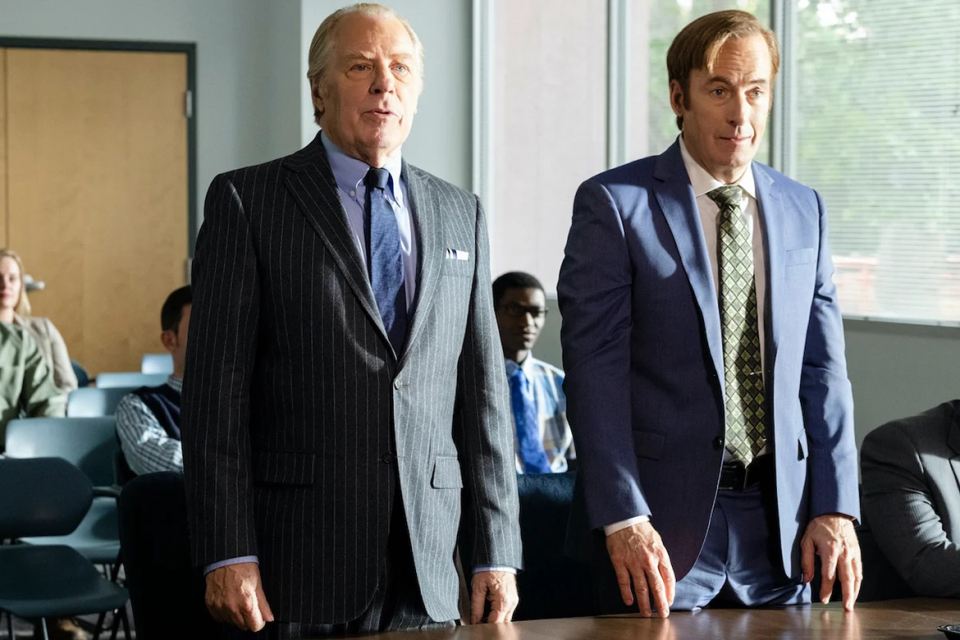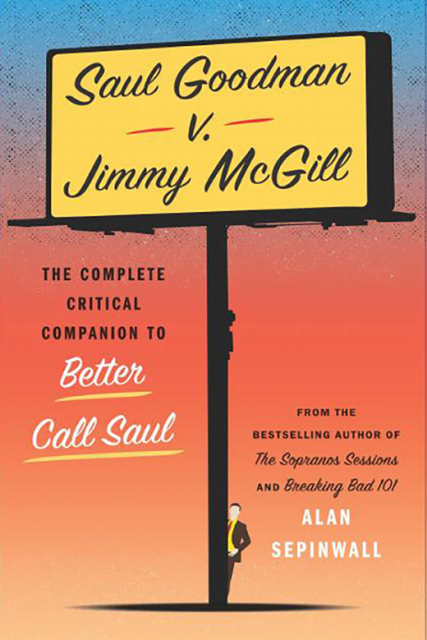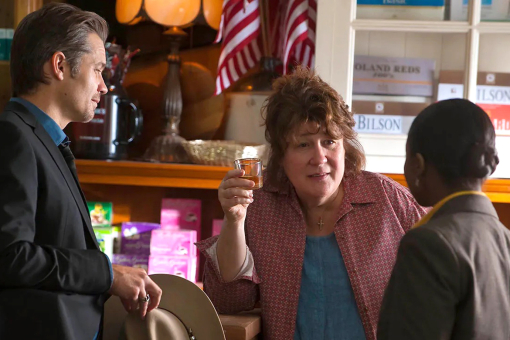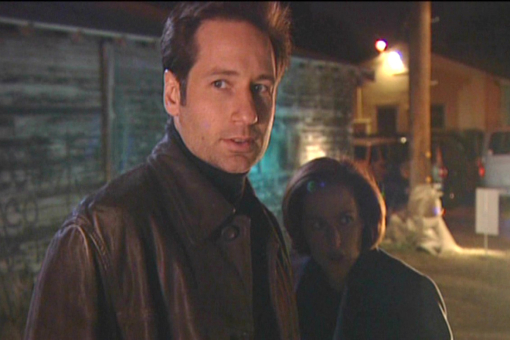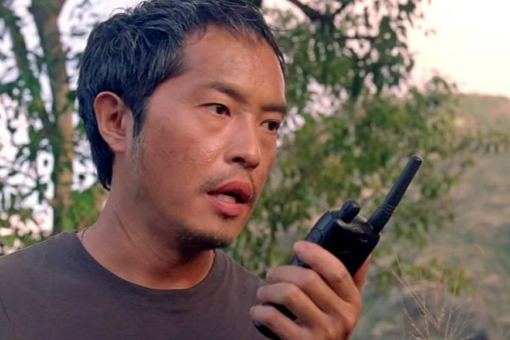"Slippin' Jimmy with a law degree is like a chimp with a machine gun."
Those devastating (but somewhat tragically prophetic) words leveled at the morally-flexible attorney James McGill (Emmy-nominated Bob Odenkirk) by his brother, the successful-but-mentally unwell lawyer Chuck McGill (Emmy nominee Michael McKean) in Season 3 of Better Call Saul proved to be one of many harbingers that led to "Slippin' Jimmy" unavoidably becoming Saul Goodman, a law-bending criminal lawyer to not one but two murdering druglords.
Audiences first met Saul in a second season episode of AMC's Breaking Bad — "Better Call Saul" — which shares the same title as the 2015 spinoff that centers on Saul's corrupt, complicated origins. Cocreated by Breaking Bad showrunner Vince Gilligan and "Better Call Saul" writer Peter Gould, Saul would go on to earn 53 Primetime Emmy nominations, becoming the most nominated drama to never win an Emmy.
The series also helped flesh out the Breaking Bad universe by reaching back into the past of a memorable supporting player from Walter White's tragic (and fatal) storyline and mining that past for six seasons of nail-biting — and, at times, heartbreaking — television.
"If they were to make a spinoff show about the character with McKean starring, it would have been wildly different", says Rolling Stone TV critic and self-professed expert on all things Saul Alan Sepinwall. "Peter and Vince, they threw out a million different ideas for what the [spinoff] was going to be before they landed on this. I cannot possibly imagine them doing this show, if it was Michael McKean as Saul/Jimmy."
Sepinwall thoroughly chronicles the spinoff we did get with his new book from Abrams — Jimmy McGill v. Saul Goodman. Jimmy McGill chronicles the development of the series with a deep-dive exploration of all 60 episodes. The book also provides a very candid post-mortem interview with Gould, where the creator of one of TV's most memorable lawyers shares casting trivia and a head-scratcher of a tale regarding a notes call with AMC almost killed Saul's appearance on Breaking Bad.
As the book arrives on shelves February 4, just in time for the show's 10th anniversary, Sepinwall spoke to the Television Academy about his writing process, what he learned from Gould about Saul's early development phase and the challenges of writing a book about a subject he is both a fan of and authority on.
Television Academy: Jimmy McGill v. Saul Goodman feels like a very comprehensive deep dive into the making of Better Call Saul. But were there a few bits of trivia or any anecdotes that were left out that you wish you could have put in?
Alan Sepinwall: There are a few things here and there. Like, for instance, Gus [Fring]'s doctor, the guy in Mexico. So, I'm going through my old show recaps, my old notes, and at a certain point, I realized — I should know this doctor’s name. It's easier to refer to him that way. So I go to the Breaking Bad and Better Call Saul Wiki pages, and he is listed as Barry Goodman. And I'm like, “Wait, first of all, how is this a name for a Mexican doctor? And second of all, why would they name a character on a show with Saul Goodman on it Barry Goodman?
So, I reached out to one of the writers on the show. I said, without context, "I'm curious where the name Barry Goodman came from?" And the writer writes back, "Wait, who's Barry Goodman?" Then I explained who it was, and they're like, "There is no way we named that guy Barry Goodman." He guessed that maybe the [actor's] agent changed it on IMDb or something, because it's always — if you talk to character actors — it's much better if their character has a name than if they're referred to by their job, just in terms of getting other work, because it looks more impressive on your resume.
There are also the names of Jimmy's film crew. In the scripts, they are always referred to as "Camera Guy," "Sound Guy" and "Drama Girl." But if you go to IMDb or the [show's] Wiki, it turns out they have names. So I went through this rabbit hole about this, and I wound up talking to the actor who plays the cameraman, and he explained that they were given names in a series of digital shorts that came out after the show was over, but on the show itself they did not have names. I could have written a really long footnote about this, and it would really amuse me, and maybe it would amuse my editor. But at a certain point, there's a level of detail beyond which you maybe don't care about — even the most obsessive Better Call Saul fan does not care about. And I'd say that's probably where the line was drawn.
So you never did, concretely, find out where the "Barry Goodman" name came from?
Never. I tried a few times. It's just — it's really weird.
You did have a footnote about another obscure-ish character from Breaking Bad: Judge Papadoumian, who was considered to be revealed at some point as Kim Wexler (Rhea Seehorn), but that didn’t happen.
Yes. And there are things like that where — I kind of consider myself a relative expert on the show, but that name did not ring any bells with me. Like, when I then went back and rewatched the show, at that point I'm hearing the name, but it's not something that stuck with me. And I remember I was once moderating a panel that AMC was hosting, and [on the panel were] Vince, Rhea and Judy Rhee, the production designer. And Vince mentions, in the middle of this event for press, like it is some kind of big announcement, that fans are going to see [a character mentioned in Breaking Bad] Lalo (Tony Dalton). And you could sort of tell that everyone in the press was going, "Wait, who's Lalo?" And I have to admit, I did not remember who Lalo was, because he's mentioned once in Breaking Bad, in an episode that was almost 10 years before Saul was even being done.
That’s fascinating, especially considering how big of a role Lalo would have and how much a fan-favorite that character would become.
There were even some arguments among the writers — Do we really need to bring Lalo back? Does anybody care? Do we need to explain everything? Because they don't explain everything. They don't explain what the deal is with Gus and Chile, which is alluded to on both shows and is never explained. So they didn't have to bring Lalo back. But thank God they did, because that's one of the great characters in either series. And Tony Dalton is so wonderful.
When this book was first announced, you retweeted my tweet about how I hoped there is a section on Kim Wexler’s ponytail. And there is some discussion in the book about it. Was that part of your original pitch for the book?
That wasn't in my original pitch. The original pitch was basically, "Because I'd done [a book like] this already with Breaking Bad, I will do that again." And then I thought, "Well, that was the first time I'd ever written a show-specific book. I think it's a good book, but maybe I could have done more than I did."
And so with this book, I did this long interview with Peter. That's brand-new material. And I did a lot more reaching out to people on the show for stuff and putting it in. That one bit, though, was kind of funny. And that I literally reached out to Rhea to be able to name the hair designer in a footnote. Something like, "I'll mention Kim's ponytail and then, in a footnote, say it was designed by so-and-so." But Rhea sends me back nearly three pages of material and I thought, "This is going in the book."
Back to your comment about getting new material from an interview with Peter Gould, it was surprising to learn that Michael McKean was on the shortlist to play Jimmy/Saul back in the day. Or the story about the notes call with the exec who almost jettisoned Saul’s introductory episode on Breaking Bad.
Right. An executive said, "I don't really like this character. Can you throw out this script and start over?" That's nuts. I can't believe that happened. The McKean [casting idea], though, is also kind of crazy just because he absolutely, 100% could have played the version of Saul on Breaking Bad. I think if they were to make a spinoff show about the character with McKean starring, it would have been wildly different. Peter and Vince threw out a million different ideas for what the [spinoff] was going to be before they landed on this. I cannot possibly imagine them doing this show if it was Michael McKean as Saul/Jimmy.
As a fan, how challenging is it for you to decide how deep to go with your forensic analysis of this show? How do you keep the balance between what you want to know and what you think everyone else might want to know?
It's hard. To a degree, I kind of have to follow my own interests and hope that overlaps with the audience's. And so, if you read the book, for instance, you can tell I'm much less enamored with the cartel stuff than I am with Jimmy and Kim. And I think there's a lot of really good material there. I'm glad they did it, but definitely the stronger half of the show — for me — is the legal world.
Jimmy McGill v. Saul Goodman is available now from Abrams Books.
Better Call Saul is now streaming on Netflix.

